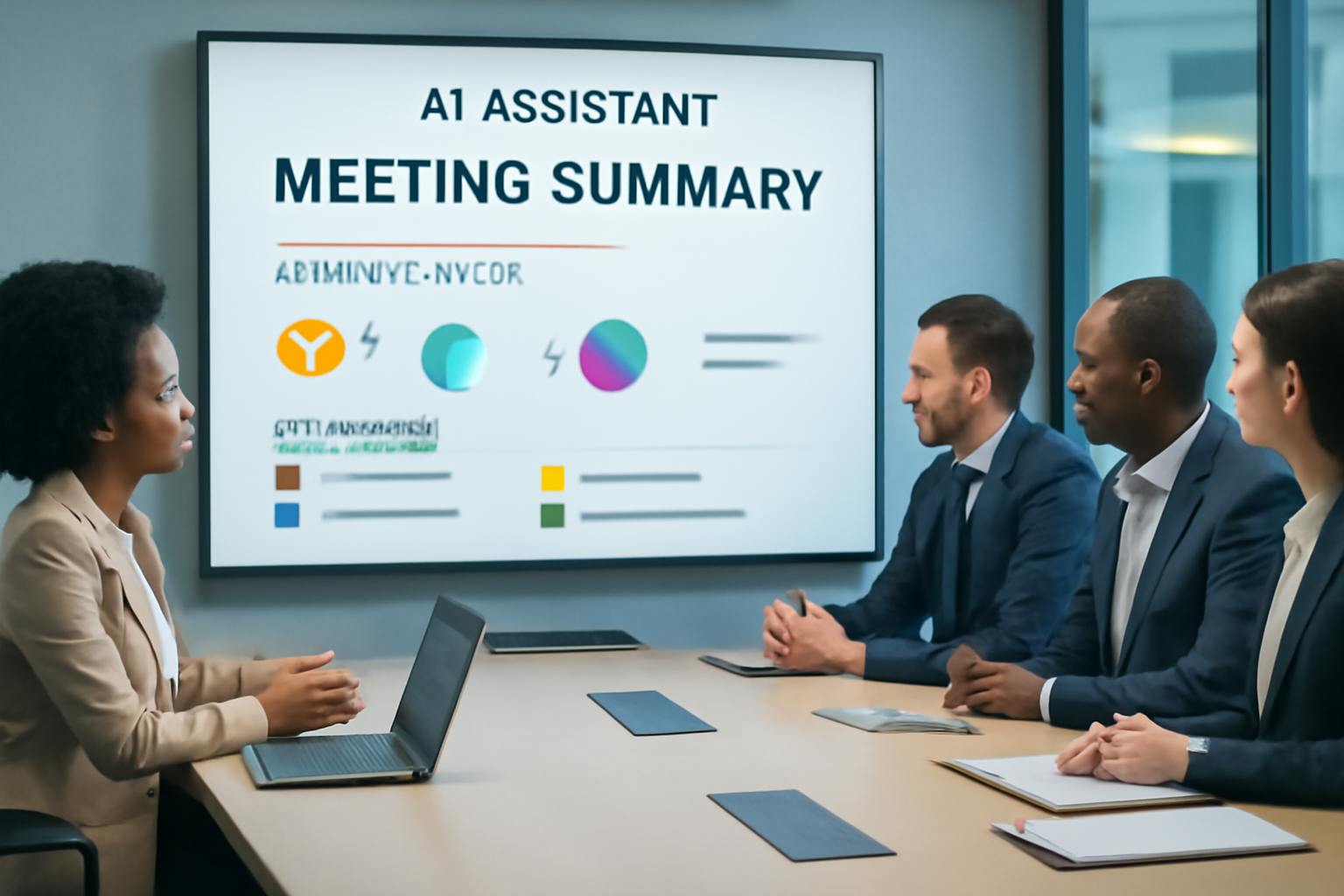Table of contents :
AI in large enterprises: how do they use artificial intelligence?
Transform your business with artificial intelligence! 65% of large enterprises already use AI according to Deloitte, revolutionizing their business processes and competitiveness. This massive adoption addresses a crucial challenge: staying competitive in an ultra-competitive market where automation and data analysis make the difference.
Ready to transform your business with AI?
Discover how AI can transform your business and improve your productivity.
Discover how industry giants concretely exploit AI to optimize their operations, improve decision-making, and create new competitive advantages.
Business process automation with AI
How does AI transform communications?
Artificial intelligence boosts business communication by automating repetitive tasks. Large organizations use tools like ChatGPT to write personalized emails and generate automatic responses adapted to context. This automation allows teams to save precious time while maintaining professional communication quality.
Companies report a 40% reduction in time spent on exchanges thanks to conversational AI. These solutions analyze tone, context, and interaction history to propose relevant responses consistent with brand image.

Automatic synthesis and assisted decision-making
AI excels at synthesizing complex information. Large enterprises exploit this capability to automate meeting minutes and identify key decisions. Artificial intelligence analyzes discussions, extracts essential points, and proposes concrete action plans.
This approach transforms decision-making by providing real-time contextual analyses. Leaders quickly access critical information, reducing decision time from several days to a few hours.
Talent management and intelligent recruitment
The HR sector particularly benefits from AI with 90% of HR teams optimizing their time through automation. Artificial intelligence analyzes applications, evaluates skills, and automates pre-selection stages.
Companies observe a 65% improvement in recruitment process efficiency. AI identifies the most suitable profiles by analyzing CVs, cover letters, and even video interviews.
Data analysis and predictive intelligence
Why are data crucial for AI?
Data constitutes the fuel of artificial intelligence. 28.5% of large enterprises use AI for data analysis, exploiting this information to optimize their operations. AI processes massive volumes of information in real-time, identifying trends invisible to the human eye.

This analytical capability allows companies to make decisions based on concrete facts rather than intuition. Machine learning algorithms detect complex correlations between different business variables.
Marketing personalization and customer recommendations
AI revolutionizes customer experience by analyzing behaviors and preferences. Companies that personalize with AI see their conversion rate progress by 20% on targeted offers.
Recommendation systems analyze purchase history, web interactions, and demographic data to propose suitable products. This personalization improves customer satisfaction and increases average basket size.
Financial forecasting and price optimization
Predictive intelligence transforms financial planning. AI-driven forecasts improve accuracy by 20 to 30% compared to traditional methods. Algorithms analyze historical trends, seasonal factors, and external economic variables.
This increased precision allows companies to optimize their inventory, adjust prices in real-time, and better anticipate market fluctuations.
Concrete cases of AI leader companies
Which sectors adopt AI most rapidly?
Financial, technological, and retail sectors lead AI adoption. 20% of large enterprises plan to use AI to produce goods or provide services, with strong concentration in robotic process automation.
The banking sector uses AI for fraud detection, risk analysis, and customer chatbots. Retail exploits artificial intelligence for logistics optimization and inventory management.
Club Med and conversational customer AI
Club Med deployed a conversational AI solution to handle customer requests. This solution answers classic questions, provides personalized quotes, and specific destination information.
The impact is significant: 50% reduction in request processing time and improved customer satisfaction thanks to 24/7 availability.
Société Générale and automotive prediction
Société Générale's subsidiary specializing in automotive leasing uses an in-house statistical tool to predict resale prices of used vehicles. This solution combines a confidence score and a sale probability index.
This approach optimizes leasing contracts and reduces financial risks related to vehicle residual value.
ROI and measurable economic benefits
What return on investment to expect from AI?
AI investment generates impressive returns. Companies can see their ROI multiplied by 3.7 for each euro invested in artificial intelligence. This exceptional yield is explained by AI's multiple impact on different business processes.
Medium-sized companies achieve average savings of 150K€ per year through automation and process optimization.
Operational cost reduction of 25 to 40%
AI automation enables operational cost reductions of 25 to 40%, particularly in support functions. Administrative tasks represent 65% of time savings, freeing employees for higher value-added missions.
This optimization translates to 40% additional time devoted to strategic missions, improving overall organizational productivity.
Productivity gains and EBITDA improvement
Complete AI integration in marketing and sales generates EBITDA gains up to 15 to 20%. These improvements come from campaign optimization, offer personalization, and sales process automation.
Companies also observe service quality improvement and reduced human errors.
Practical AI implementation in enterprises
How to choose the right AI platform for your business?
Choosing an AI platform must consider several essential criteria: ease of use, data security, and diversity of available tools. Companies seek solutions that enable rapid adoption without compromising governance.
Integration must be progressive, starting with simple use cases before extending to more complex processes.
Swiftask: democratizing AI without security compromise
Swiftask positions itself as the first SaaS platform that democratizes AI in enterprises while guaranteeing optimized governance. This solution enables reducing AI project deployment time by up to 60% and increasing AI tool adoption by 40%.
Swiftask brings together over 80 cutting-edge AIs (OpenAI o1, Claude 3.5 Sonnet, Perplexity Pro) accessible from a single platform. Companies can create their own intelligent agents without coding, while giving IT departments total control over access and data confidentiality.
Key steps to successful AI integration
AI project success relies on a methodical approach. Start by identifying high-impact processes with low technical complexity. Train your teams on new tools and establish clear performance metrics.
Change management remains crucial: 65% of failures come from organizational resistance rather than technical limitations. Involve end users from design to guarantee adoption.
AI profoundly transforms large enterprises, generating productivity gains and substantial savings. With platforms like Swiftask, this transformation becomes accessible to all organizations, democratizing artificial intelligence while preserving data security and governance.
author
OSNI

Published
June 13, 2025
Ready to transform your business with AI?
Discover how AI can transform your business and improve your productivity.